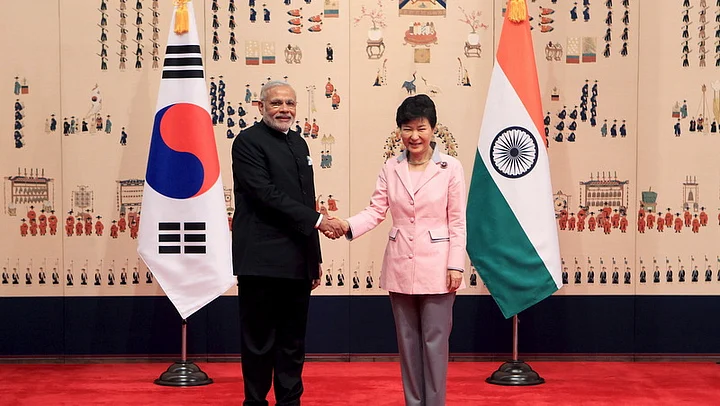Prime Minister Narendra Modi’s final stop, South Korea, in his recent three-nation tour was significant, and it would be fair to say that in economic and strategic terms it was not successful merely in terms of announcements, but also tangibles. Both sides seemed enthusiastic about giving a strong push to bilateral ties, while also recognising the major impediments. The fact that there are more convergences than divergences is a major positive.
Economic Outcomes
One decision which could play an important role towards strengthening ties between both countries was the decision of South Korea to provide $10 billion for infrastructural development in India. The Ministry of Strategy and Finance and the Export-Import Bank of Korea expressed their intention to provide $10 billion for cooperation. This shall be used for development of smart cities and upgradation of railways.
These are two of Modi’s priority areas and Korean assistance could help both in infrastructural upgradation and accelerating the level of economic growth. Both countries will also find synergies for ship building. This is an area where South Korea has excelled, and Modi, who visited the Hyundai Heavy Industry Shipyard, acknowledged this.
Modi, Park, and Bilateral Ties
The political leadership of both countries also sought to play their part in promoting business linkages. The India PM along with the South Korean President Park Guen-hye addressed a first group of South Korean and Indian CEOs. While there is no doubt, that South Korea already has a strong presence in India, and Modi referred to companies such as LG, Hyundai and Samsung which are household names.
Yet, engagement with the business community was much needed, since Korean investors had developed serious apprehensions about India after the withdrawal of POSCO. During the interaction, the South Korean president also referred to the potential of both Modinomics and 3.0 playing an important role not merely in reviving the economies of both countries but also lifting the global economy.
Strategic Partnership
Both countries also emphasised the need for strengthening the strategic partnership, and it was in fact decided by both sides to upgrade the relationship to a ‘special strategic partnership’. The Indian PM referred to the importance which India gives to South Korea in its Act East policy, this point was also highlighted in the ‘Joint Statement For Special Strategic Partnership’ after talks between Modi and President Park.
Some of the other important issues listed in the joint statement were closer cooperation between the national security councils of both countries, the need for cyber security cooperation, greater synergy between shipyards of both countries, the need for finding complementarities between India’s Act East policy and South Korea’s North East Asia Peace and Cooperation Initiative and a 2+2 diplomatic and security dialogue including the defence and foreign ministers of the two sides.
While invoking the need for greater cooperation between both countries for the growth of Asia, Modi did not forget to highlight one of the shared similarities of both countries — democracy. He dubbed it as a ‘strong pillar of democracy’. This was a clear message to countries in Asia and outside that India considers democracy as a major binding factor.
The Right Signals
While the PM’s South Korea visit sent the right signals both to the political leadership and the business community, some of his policies like ‘Make in India’ and the emphasis his government is giving to economic growth seems to have found resonance. A lot will depend on how domestic issues, especially those pertaining to investors’ concerns are addressed.
The Modi government by itself cannot single handedly create a conducive atmosphere for investors; a lot also depends upon the attitude of state governments. Modi rightly flagged the role of soft power, specifically
Bollywood and other Indian art and culture in the bilateral relationship, something India has not used sufficiently, and can potentially use to its advantage. Both countries signed an agreement under the provisions of CEPA, for facilitating co-production of films, animation and broadcasting programmes as well as greater collaboration between the Indian and Korean film industry.
While furthering economic links cannot be achieved instantly, greater cultural, educational and tourism links could further bolster the relationship. In the past few years, the number of Indians visiting Korea has witnessed a dramatic rise and there should be a greater emphasis on strengthening this.
The India-South Korea relationship may be driven by economics, but is certainly not restricted to it. New Delhi and Seoul should thus tap all possible areas of collaboration. This will require greater engagement at all levels.
(The writer is a Senior Research Associate with The Jindal School of International Affairs)
